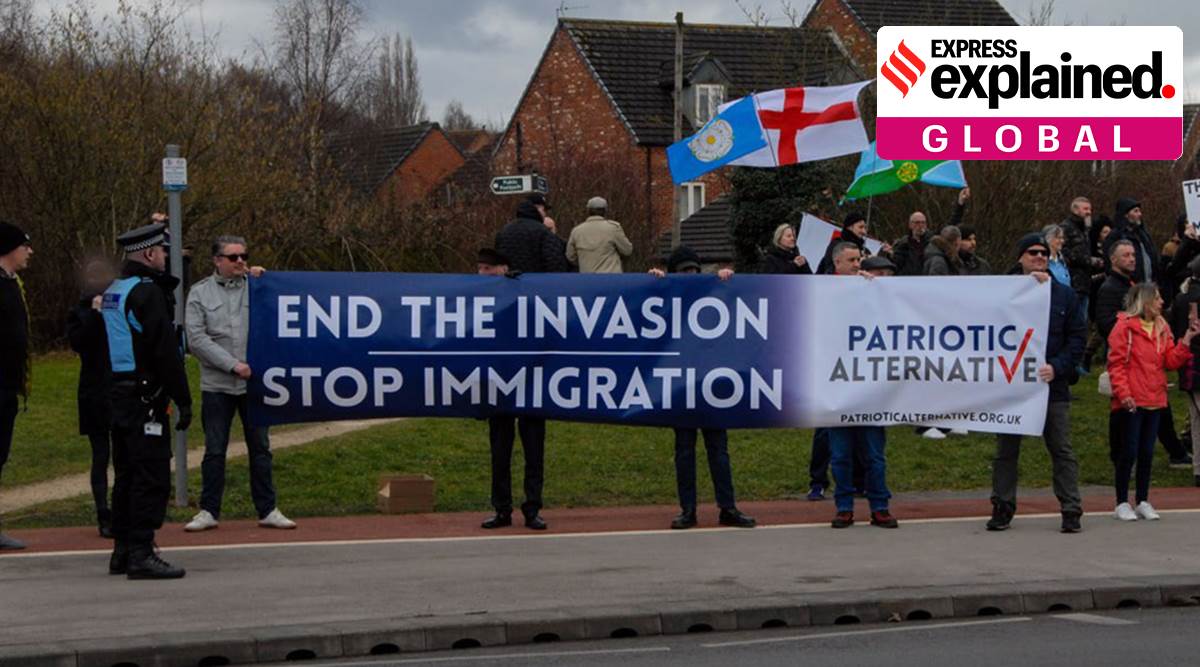Why the United Kingdom is seeing a rise in anti-immigration protests
With an uptick in the influx of asylum seekers and illegal migration, protests have become a common occurrence across Britain in the past few weeks.

About 300 people participated in a public meeting that took place at Dunstable, a small town in the United Kingdom, on February 16 to raise concerns regarding the recent arrival of asylum seekers at a local hotel, The Guardian reported.
The meeting witnessed local residents accusing the migrants of sexually harassing young girls in the town, taking up too many dentist appointments and occupying too much space on the pavement.
With an uptick in the influx of asylum seekers and illegal migration, such events have become a common occurrence across Britain. In the past few weeks, several protests have been organised, especially by far-right groups, in front of hotels accommodating migrants.
Just days before the Dunstable public meeting, 15 people, including a 13-year-old boy, were arrested after protests turned violent in Knowsley, near Liverpool. The incident took place when hundreds of demonstrators gathered outside a hotel housing asylum seekers and chanted “get them out”. Similarly, on Sunday, 15 protestors were detained in South Yorkshire after anti-immigration groups clashed with the police outside a hotel, where asylum seekers were staying. Such demonstrations also took place in Cannock last week.
Why is Britain witnessing so many anti-immigrant protests?
According to Al Jazeera, in the recent past, there has been a significant increase in the number of migrants and asylum-seekers entering the UK illegally — they are coming via the English Channel in small boats. While in 2022 more than 45,000 people reached by that route, this year (till the first two weeks of February) around 3,300 have so far arrived in the country, official figures state.
Notably, in early February, the Times newspaper said Indians were the third-largest group of migrants crossing into the UK through the English Channel in 2023. As per the report, around 250 Indian migrants entered by this means in January. Afghans were the most numerous, followed by Syrians.
The Channel crossings have become a political issue as local communities, particularly those living in working-class areas of north and central England, allege that the asylum seekers and migrants are stretching public services and making it hard for them to find work. Moreover, tensions have escalated especially in economically challenged areas, where the hotels are being used by the British government to place asylum seekers awaiting the outcome of their applications.
Last week, Hope Not Hate, an advocacy group based in the UK which campaigns against racism and fascism, released new research in which it was found that “visits to hotels housing asylum seekers from self-proclaimed “migrant hunters” more than doubled in 2022 from the previous year”, Daily Express newspaper said.
Who is behind these protests?
Media reports suggest that the anti-immigration protests across Britain are being mostly led by far-right groups. Among them, the most active one is the Patriotic Alternative. According to The Guardian, the group’s members were among the demonstrators who clashed with the police in Knowsley on February 10.
Formed in 2019 by an antisemitic, conspiracy theorist Mark Collett, Patriotic Alternative “grew out of splits in the BNP (British National Party, which is also a far-right organisation) and other groups, led by a digital savvy younger generation seeking to present themselves as a “white pride” organisation concerned with the environment and heritage”, The Guardian said.
Known for promoting neo-Nazi and white nationalist ideology, the collective aims to deport people of “migrant descent” and opposes all kinds of immigration unless one can prove their British ancestry. It has reportedly supported Holocaust denial, political violence and the white genocide conspiracy theory, Hope Not Hate said.
Patriotic Alternative members also made headlines on February 12, when they participated in a protest against a drag queen storytelling event outside Tate Britain, a museum in London.
How has the British govt responded?
The Rishi Sunak-led government so far hasn’t said anything about these protests but has acknowledged the rise in illegal migration, saying it is now planning new legislation to address the issue. Several news outlets have reported that the authorities would soon start deporting small-boat asylum claimants either to their country of origin or Rwanda.
Also, the UK prime minister is considering withdrawing from the European Convention on Human Rights (ECHR) in order to crack down on illegal immigration.
The government’s stance isn’t a surprise as its top ministers have been known to speak against asylum seekers, migrants and refugees quite frequently. In November last year, Home Secretary Suella Braverman described the arrival of migrants on English shores as an “invasion”.
Where else anti-immigration protests are happening?
Apart from Britain, numerous demonstrations have taken place in Ireland recently. On February 6, thousands of people descended on the streets of Dublin to protest against asylum seekers. Previously in January, a group of at least 350 anti-migrant protesters clashed with a smaller counter-protest in central Dublin.
The demonstrators were seen raising placards and signs, saying “Ireland is full”, “Ireland is for the Irish” and “Irish lives matter”.
According to reports, anti-immigration sentiments in Ireland have soared after the country’s minister of state for integration, Joe O’Brien, recently in an interview said that they should be planning for at least 80,000 migrants and asylum seekers to reach the nation during the course of 2023.
Last year, Ireland received a total of 83,814 people, including more than 70,000 Ukrainians.
Immigration has become a bitterly debated subject in Europe, especially after millions of migrants arrived on the continent in 2015 and continue to do so in large numbers. According to EU border agency Frontex, some 3,30,000 people came last year, the highest since 2016, with a sharp increase on the Western Balkans route, Reuter reported.